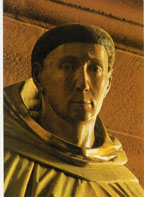 St. Herman Joseph
St. Herman Joseph
Little Herman (he received the name of Joseph later as a monk), from his earliest years, manifested a most tender devotion to the Mother of God, and almost as soon as he could speak, he begged his mother to teach him how to honor her. His parents were very poor, but they taught him to confide in Jesus and Mary and he would, in all simplicity, tell Them of all his childish wants. He often had to go barefoot in the coldest weather, and one day he came to pray before the statue of Mary, with his feet all blue with cold.
"Herman," said Our Lady, "why do you go barefoot when it is so cold?"
"Because, my Mother, I have no shoes, for my parents are poor," he replied.
"Go to that stone," said Mary, "and you will find all the money you need for shoes." The child went and found the price of his shoes as Our Lady had told him, and returned to thank her. "Whenever you are in need of anything," Our Lady told him, "all you have to do is to go to that stone. But you must always go with full confidence."
He never made use of the treasure except in extreme need, and it never failed him. His companions discovered the stone, but never could they find any money there.
The next day Herman stopped at church to thank Our Lady for his new shoes, and of course, he wanted to show them to Our Blessed Mother and the Child Jesus. Then he had a thought. What could he give Our Lady in gratitude? He was too poor to light a candle and he had no flowers. Then he remembered. His mother had given him a shiny red apple with his lunch. Yes, he'd give it to Our Lady and she could give it to the Child Jesus. But there was a problem. The statue was high up and Herman was very small. He stood on his tiptoes trying to reach the hand of the statue. Still it was too high. Little Herman said, "Here, Blessed Mother." Then the statue's arm and hand reached down to receive the gift, and thanked him. Those who later visited the Church saw the statue reaching down and holding an apple. Even to this day, the devout leave fresh apples at the foot of this statue in remembrance of this event.
There is much that we can learn from this. First, to turn to Our Lady with all our needs. Secondly, to be grateful, to offer Our Mother, in gratitude, a prayer, a sacrifice, a candle or flower, or whatever is important to us. How touched Our Lady must have been to see little Herman offering Her an apple. It was a miracle, but Herman didn't think it was unusual for Our Lady to reach down to accept his gift. Let us be like St. Herman, to be childlike in our devotion to Our Blessed Mother, for she really is Our Mother and we really are her children.
At the age of 12 St. Herman entered the Premonstratensian monastery at Steinfeld, Germany, and there led an angelic life of purity and prayer.
When he was old enough, he was accepted as a member of the Order and was assigned the task of waiting on tables in the refectory. Although he performed these menial tasks diligently, as a gifted mystic he would have preferred to be allowed to spend all his time in prayer. Our Lady settled his dilemma in a vision. She told him that nothing pleased God more than seeing a person serving his own brothers and sisters in charity.
Later, Brother Herman was appointed a sacristan. He liked that job, for it gave him more opportunity to be in the monastery chapel.
After his ordination to the priesthood, Herman became noted for the devotion with which he celebrated the Holy Sacrifice of the Mass. Indeed, he fell into an ecstasy of prayer so often at Mass that his Masses went on "forever." Eventually, nobody wanted to serve him at Mass, because it took so much of the server's time!
As a monk, Father Herman retained all the blameless innocence of spirit that had characterized him as a child. He was much loved for his readiness to help everybody. But while he had practical skills (he was an able mechanic and clock-maker), he was essentially a contemplative.
His confreres jokingly called him "Joseph" for his attention to the Madonna and Child. Typically, he declared himself unworthy to be called after the father of the Holy Family. But Our Lady took a fancy to the name, and in a vision put upon his finger a wedding ring to confirm that he was her spiritual spouse. On the basis of this vision, Herman added "Joseph" to his other Christian name.
St. Herman Joseph had never been physically healthy, and Our Lady reproved the smallest faults in Her beloved one; and for Her dowry, She conferred on him the most cruel sufferings of mind and body, which were especially severe on great feasts of the Church. But with the cross Mary brought him the grace to bear it bravely, and thus his heart was weaned from earthly things, and he was made ready for his saintly death, which took place in 1241.
St. Herman Joseph was canonized in 1958, the last saint to be canonized by HIs Holiness, Pope Pius XII.
NEW: Alphabetical Index
Visit also: www.marienfried.com
